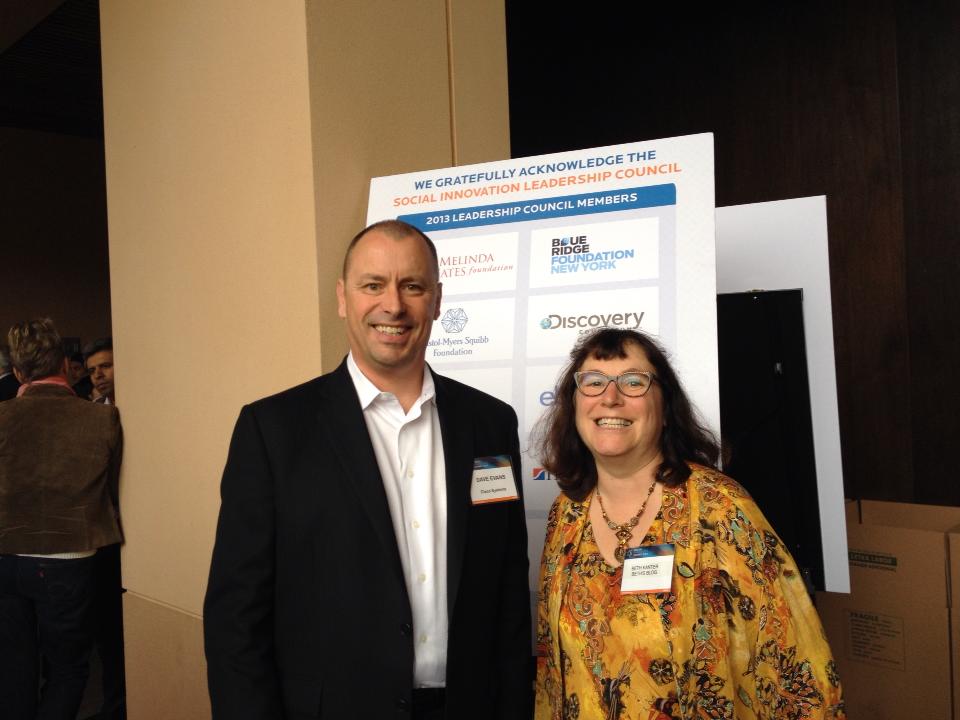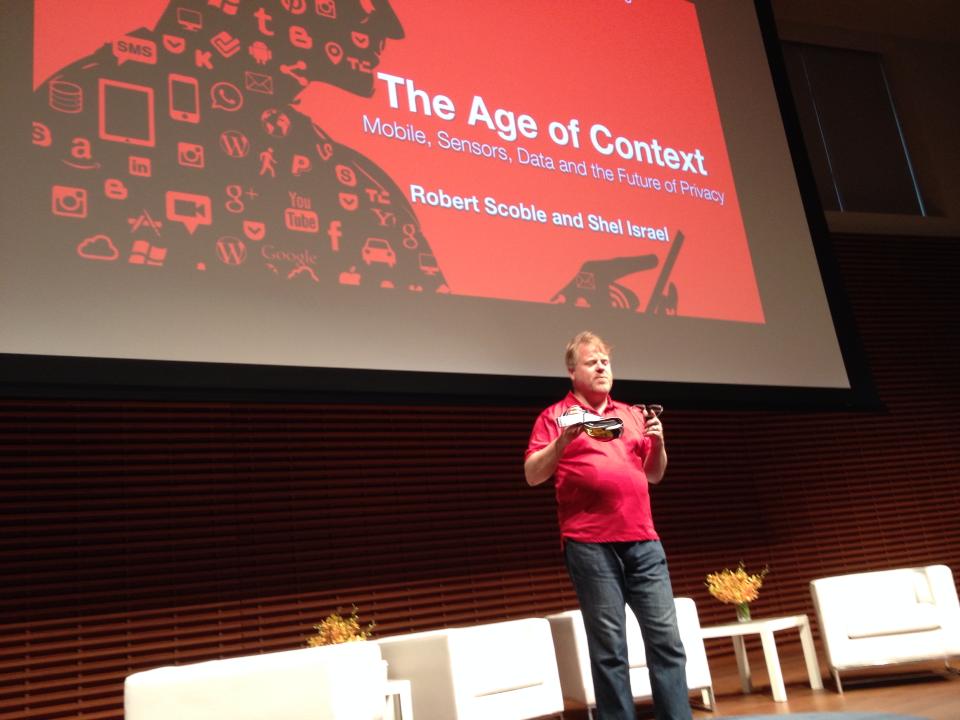
I just spent two amazing days at the Social Innovation Summit 2013, a cross disciplinary crowd of people who work on social good in the areas of technology, investment, philanthropy, international development, and business. The sessions shared solutions about partnerships and programs that are disrupting the social good sector. I have been going for the past few years and every time I leave with lots of inspiration and learning. One of the plenary sessions, the “Connected World,” focused on sharing how current and future technologies that are disrupting poverty.
Jacquelline Fuller, Director of Giving at Google, was the MC for the session which included lighting rounds and arm chair discussions with Tim O’Reilly, Lelia Janah, founder of Samasource, Marshall Davis Jones, Poet, Dave Evans, Futurist at Cisco, and Robert Scoble. Fuller framed the session by sharing examples of early adopters in the nonprofit sector riding the wave of three big tech trends that are “particularly ripe,” mobile, crowd funding, and big data.
[slideshare id=28470060&doc=socialinnovationsummit-131120182509-phpapp02]
Tim O’Reilly, a board member for Code for America, gave a talk called “Using Technology To Put Citizens First: Technology and Trust – Challenges of 21st Government. Through its programs, Fellowship, Brigade, Accelerator,Peer Network and Code for All, Code for America aims to improve the relationships between citizens and government. O’Reilly took us through some examples of designing with citizens in mind can radically change the trust equation. The quote that stood out for me that sums it all best and it is from the founder of Code for America’s founder, Jennifer Pahlka, “What if we felt about government the way we feel about our iphones?”
Next up was an armchair discussion with Lela Janah, Founder and CEO of Samasource with Noah Wintroub, Global Head of Internet and Digital Media at JP Morgan. Samasource is an enterprise digital services through a unique Microwork model that harnesses the untapped potential of the world’s poor. “Sama” means equal. Samasource connects poor women and youth to training and employment in the digital economy. As a premier provider of digital services, they deliver a steady flow of work to people around the world. Lela talked about how and why sound founded this enterprise in 2008 and their programs that are disrupting poverty. She was an inspiration – one of my favorite quotes – “To whom much is given, much is expected.”
Next up was Dave Evans, Chief Futurist at Cisco. Dave and I have something in common – Conan O’Brien made fun of our LinkedIn Profiles on his show. Conan asked, “What’s a Futurist do?” Dave analyzes trends and technologies to predict what is next on the horizon. When his reports come out, they are the most downloaded on the Internet. He gave a provocative talk – pointing out population trends, migration trends, and the impact it is going to have on our food, water, and health care systems. To sum it all, now that people are connected, more things will be connected – so we’re all connected.
Hey #SIS13 thanks for all the love. Now, how about getting me out of this cage?
— Tweeting Cow (@Cow1321443) November 20, 2013
He was talking about the issue of food waste. He said in the future there will sensors on livestock that will give us data about them. “The cows will be tweeting.” And, of course, someone set up a spoof Twitter account. Dave wrote this follow up post summarizing his remarks at the conference over the Huffington Post Impact Section.  Next up was Robert Scoble who gave a talk about the “Age of Context.” Before he walked on stage, my colleague, Simon Mainwaring, snapped this close up of Scoble wearing a ski mask.
Next up was Robert Scoble who gave a talk about the “Age of Context.” Before he walked on stage, my colleague, Simon Mainwaring, snapped this close up of Scoble wearing a ski mask.  It wasn’t just any ski mask. It takes your vital signals, it is a camera, it can tell you the location of other people who went skiing with, the temperature, your speed while your skiing. As Scoble said, doesn’t it make the story better of how scared you were if you can show a graph of your heart rate along with what you were seeing as you going down the mountain at 80 miles per hour. Scoble said there are five technologies that are contributing to the age of context. These are mobile, sensors everywhere (wearable technology), location data, social networks, and big data and machine learning. These are creating an age of context – where because so much data is being collected about you – that everything will be tracked and customized. He talked about how you when you shopping and reach for some cereal on the grocery shelf, a sensor will track your hand and tell you about the other products on the shelf. He said that customer details will be know so that business will customize the experience. He gave the example of “Vin Tank” which an example of how ambient data on social channels is being used by companies now. But in the future – say if you are talking about 2 buck chuck wine vs Chateau Rothschild, the wine store will know this and perhaps customize your experience in the store. He talk shared examples that are in his book, “Age of Context,” a must-read for those of us in the nonprofit tech sector and beyond. As Scoble was describing the technologies and their implications on society, I couldn’t help but feel a chill and almost a desire to be “off the grid.” Scoble did not discuss the privacy implications when there is a human at the other end of this aggregated data and what the ethics policies should be. He said, “yes you will be tracked, but your experience will be customized.” This is the context for Lucy Bernolz’s work on privacy and big data. If wasn’t for this spoken word poem about human connections, I think I might have felt that humanity is being lost through tech.
It wasn’t just any ski mask. It takes your vital signals, it is a camera, it can tell you the location of other people who went skiing with, the temperature, your speed while your skiing. As Scoble said, doesn’t it make the story better of how scared you were if you can show a graph of your heart rate along with what you were seeing as you going down the mountain at 80 miles per hour. Scoble said there are five technologies that are contributing to the age of context. These are mobile, sensors everywhere (wearable technology), location data, social networks, and big data and machine learning. These are creating an age of context – where because so much data is being collected about you – that everything will be tracked and customized. He talked about how you when you shopping and reach for some cereal on the grocery shelf, a sensor will track your hand and tell you about the other products on the shelf. He said that customer details will be know so that business will customize the experience. He gave the example of “Vin Tank” which an example of how ambient data on social channels is being used by companies now. But in the future – say if you are talking about 2 buck chuck wine vs Chateau Rothschild, the wine store will know this and perhaps customize your experience in the store. He talk shared examples that are in his book, “Age of Context,” a must-read for those of us in the nonprofit tech sector and beyond. As Scoble was describing the technologies and their implications on society, I couldn’t help but feel a chill and almost a desire to be “off the grid.” Scoble did not discuss the privacy implications when there is a human at the other end of this aggregated data and what the ethics policies should be. He said, “yes you will be tracked, but your experience will be customized.” This is the context for Lucy Bernolz’s work on privacy and big data. If wasn’t for this spoken word poem about human connections, I think I might have felt that humanity is being lost through tech.
@JonesConnects shares his most powerful moments…birth of his child, Sandy destroying NJ…@socinnovation #SIS13 pic.twitter.com/xpreRyw7qy
— Jaime Nack (@jaimenack) November 20, 2013
I also attended break out sessions on social capital (by Meg Garlinghouse from LinkedIn), a session on learning from failure where all three panelists were trained in improv (very fun session), and one on partnerships with Barbara Bush, Founder of Global Health Corps who sat down with me to discuss learning in networks. These are fodder for future blog posts – so stay tuned.
